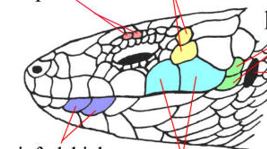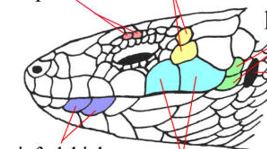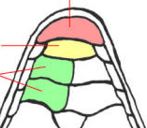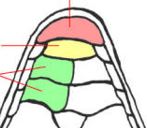Practical 2 - Lizards
1/82
There's no tags or description
Looks like no tags are added yet.
Name | Mastery | Learn | Test | Matching | Spaced | Call with Kai |
|---|
No analytics yet
Send a link to your students to track their progress
83 Terms
“Glass Lizard” family
Anguidae
“collared lizards” family
Crotaphytidae
“gecko” family
Gekkonidae
“lacerta and wall lizards” family
Lacertidae
“earless and horned lizards” family
Phrynosomatidae
“skinks” family
Scincidae
“racerunners” family
Teiidae
Anguidae general characteristics
long, legless, grooved side
Anguidae genera in KS
Ophisaurus
Slender Glass Lizard
Ophisaurus attenuatus
Ophisaurus attenuatus distribution
Eastern 2/3 of KS (patchy in middle 1/3)
Ophisaurus attenuatus characteristics
eyelids, external ear openings, grooved side, hard, drops tail, dorsal stripes, 1/3 body 2/3 tail
Ophisaurus attenuatus life history
diurnal insectivores (may eat small vertebrates), frequents rodent burrows
Crotaphytidae general characteristics
big head, black collar
Crotaphytidae genera in KS
Crotaphytus
Eastern Collared Lizard
Crotaphytus collaris
Crotaphytus collaris distribution
North Central, South Central, SE KS (3 main populations)
Crotaphytus collaris characteristics
big head, 1-2 dark collars, small granular scales, males have yellow throat/brighter colors, females have transverse orange bars
Crotaphytus collaris life history
males bigger (territorial), rocky areas, eat whatever fits in their mouths, females protect nests of 1-13 eggs
Gekkonidae general characteristics
gecko
Gekkonidae genera in KS
Hemidactylus
Mediterranean House Gecko
Hemidactylus turcicus
Hemidactylus turcicus distribution
scattered urban areas
Hemidactylus turcicus characteristics
large toe pads, bumpy cream/brown spots, clean belly, tail sometimes banded
Hemidactylus turcicus life history
introduced in KS, nocturnal (hangs out near lights at night), females lay several small clutches (~ 2 eggs) throughout summer, females identified by presence of eggs seen through belly
Lacertidae genera
Lacerta, Podarcis
Western Green Lacerta
Lacerta bilineata
Lacerta bilineata distribution
Topeka, between 470 and Washburn University
Lacerta bilineata characteristics
usually greenish, fast, powerful hindlimbs, small scales, males bright green with black specks and a blue throat, juveniles brown with spots and light lines, big
Lacerta bilineata life history
eats invertebrates, fruit, and fledgling birds, isolated patch in Topeka since 1970’s (not spreading)
Italian Wall Lizard
Podarcis siculus
Podarcis siculus distribution
Topeka, Hays, Lawrence
Podarcis siculus characteristics
small granular scales on back, large rectangular plates on belly, 2 green stripes bordering dark stripe, spotted sides, back stripe, males have red throats cheek and forelegs in spring
Podarcis siculus life history
urban areas (introduced), invertivore
Phrynosomatidae genera
Holbrookia, Phrynosoma, Sceloporus
Common Lesser Earless Lizard
Holbrookia maculata
Holbrookia maculata distribution
western 2/3 KS, last recorded in Wichita in 1955
Holbrookia maculata characteristics
blunt face, no ear opening, eyes on side of head, paired dark blotches down back, light dorsal line, 2 black bars on side behind front legs, males have yellow tint on lower sides and blue outline on side bars, gravid females have pink/peach tint and yellow throat patch
Holbrookia maculata life history
diurnal (except in peak of summer days), eats invertebrates and small vertebrates, potentially declining due to woody encroachment
Texas Horned Lizard
Phrynosoma cornutum
Phrynosoma cornutum distribution
S. KS, interior half of I-70 corridor
Phrynosoma cornutum characteristics
flat body, big spikes
Phrynosoma cornutum life history
larger females, diurnal, prefers harvester ants, eggs laid in burrows, toxigenic (squirts toxin onto body surface), toxin targets canids to taste bad, skin has capillary action to bring water to the mouth
Prairie Lizard
Sceloporus consobrinus
Sceloporus consobrinus distribution
localized in rangeland, sandy riparian corridors
Sceloporus consobrinus characteristics
alternating dark/light stripes, breeding males have iridescent blue sides, SE KS is gray/brown with transverse zigzags, rest of KS is stronger stripes with weak zigzags
Sceloporus consobrinus life history
2 potential species (western/eastern), diurnal, insectivore, sometimes called a fence swift or fence lizard
Scincidae general characteristics in KS
small shiny scales
Scincidae genera in KS
Plestiodon, Scincella
Coal Skink
Plestiodon anthracinus
Plestiodon anthracinus distribution
East of Flint Hills
Plestiodon anthracinus characteristics
small smooth scales, 5-7”, tan/brown, broad black side stripe with thin cream border, single postmental scale, juveniles are jet black w/purple tail
Plestiodon anthracinus life history
rare in KS, forage under leaves or cover near streams
Prairie Skink
Plestiodon septentrionalis
Plestiodon septentrionalis distribution
patches of eastern 2/3 KS, not SE
Plestiodon septentrionalis characteristics
two postmental scales, northern pop: light gray/tan, eye stripe runs down tail. southern pop: darker tan/copper, eye stripe stops around the hind legs
Plestiodon septentrionalis life history
2 potential species (southern/northern), eats invertebrates, secretive, sandy soil grasslands, females guard eggs, juveniles have blue tails and are darker/black
Common Five-Lined Skink
Plestiodon fasciatus
Plestiodon fasciatus distribution
forested eastern ¼ of KS
Plestiodon fasciatus characteristics
4 supralabials, 2 postlabials, brown/black body, 5 cream stripes, juveniles have blue tail, males brown with no stripes, males have orange head in breeding condition
Plestiodon fasciatus life history
insectivore, can drop tail, females guard nests, blue tail neurotoxic to cats
Broad-Headed Skink
Plestiodon laticeps
Plestiodon laticeps distribution
easternmost counties south of Johnson County
Plestiodon laticeps characteristics
5 supralabials, brown/black body, 5 cream stripes, juveniles have blue tail, males are brown with no stripes, males have orange head in breeding condition
Plestiodon laticeps life history
locally abundant in a few places, 2x the size of P. fasciatus, assoc w/ mature Oak woodlands, KS state threatened
Great Plains Skink
Plestiodon obsoletus
Plestiodon obsoletus distribution
statewide (probably)
Plestiodon obsoletus characteristics
big, tan/brown scales edged in dark brown/black gives mottled or chainmail appearance, scales run diagonal, males have swollen heads with some orange
Plestiodon obsoletus life history
stay close to burrows, will eat anything (including other lizards), close to water in arid areas, nest guarding, drops tail
Little Brown Skink
Scincella lateralis
Scincella lateralis distribution
rivers of eastern 1/3 and S. Central KS
Scincella lateralis characteristics
small, thin legs, tan/copper back, dark eye stripe to tail, cream/yellow belly, “eye window”
Scincella lateralis life history
eats small invertebrates in leaf litter, often heard rustling in leaves, “swims” through litter and sand instead of running
Teiidae general characteristics
fast, big hindlimbs, racing stripes
Teiidae genera in KS
Aspidoscelis
Six-Lined Racerunner
Aspidoscelis sexlineata
Aspidoscelis sexlineata distribution
statewide
Aspidoscelis sexlineata characteristics
fast, 6 light cream stripes on tan/brown, green sides, big hind legs, small granular scales, males have blue on jaws and belly
Aspidoscelis sexlineata life history
fast and alert, active diurnal hunter, eats invertebrates, abundant in loose soil and open habitat

light blue scales
supralabials

light green scales
post labials

red scales
mental scales

yellow scales
postmental scales